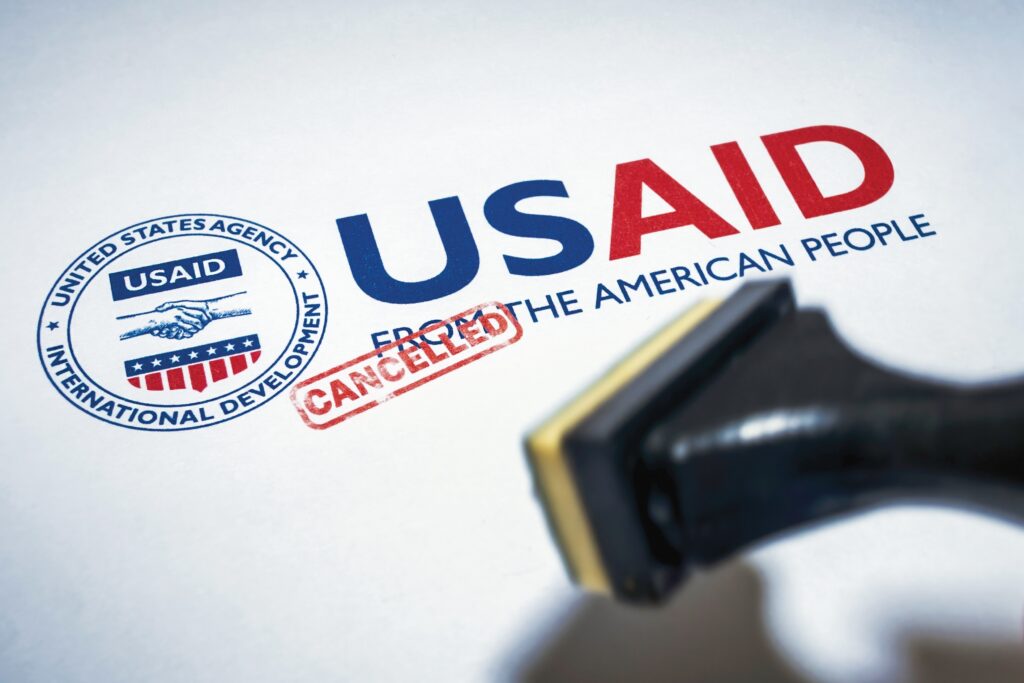Australia must vow to never to let our public health service suffer in the same way as the United States, write Robert Steinglass and C John Clements AM.
We have witnessed extraordinary events in the United States during the first months of the new Trump administration. Staggering cuts across the health sector, including research centres, have left many aghast.
While the need for fiscal reform may be urgent in that country, wholescale cuts have been implemented without apparent understanding of their impact on both domestic and global health. This is tragic as, until now, the US has been at the forefront of support for domestic and global public health initiatives.
Since starting 50 years ago with continuous USAID (US Agency for International Development) support, the Expanded Programme on Immunization (EPI) (spearheaded by the World Health Organization [WHO] and the United Nations Children’s Fund [UNICEF]) helped countries raise global vaccination coverage among infants from 5% to 86% and helped countries prevent an estimated 154 million child deaths, according to a recent study in The Lancet.
Since 1990, the US has helped reduce global annual child mortality by half, largely by supporting immunisation. The current US cuts have derailed progress in reducing most of the remaining 8.5 million maternal, newborn, child and adolescent deaths and stillbirths that occur globally each year and are preventable through low-cost, life-saving interventions.

Grave consequences to cuts
The Trump administration’s abrupt defunding of programs at USAID, WHO, UNICEF and Gavi (the Vaccine Alliance) has led to chaos, resulting in millions of young children missing vaccinations now and in coming years. This callous decision means many hundreds of thousands of young children will die needlessly and prematurely in the near term from vaccine-preventable diseases. Fewer female adolescents will be vaccinated now with a cancer-preventing vaccine that protects against the virus that causes cervical cancer later in adulthood. Fewer children will be protected now against chronic hepatitis infection, which frequently surfaces in adulthood as liver cancer. And the global fight to eradicate polio will be further delayed.
A recent study in The Lancet analysing data from 26 countries found that if international support declines, an additional 4.43 to 10.75 million new human immunodeficiency virus (HIV) infections (including up to 880 000 in children) could occur by 2030. In the same period, 770 000 to 2.93 million more people could die from HIV-related causes, with up to 120 000 of these deaths affecting children.
Diseases allowed to proliferate overseas will certainly reach the shores of Western nations. Investment in immunisation saves lives both domestically and overseas and prevents needless epidemics. Every $1 of global investment was estimated to save $16 to US$44. In 2000, Gavi was created with major support from the US to purchase new vaccines against life-threatening diseases for 75 resource-poor countries on an annual declining and sustainable cost-share basis. Funding to Gavi from the US Department of Health and Human Services (HHS) has been completely cut.
As if the defunding of vital public health programs globally was not enough, the US Secretary of HHS has now sacked the entire membership of the ACIP (the Advisory Committee on Immunization Practices), replacing them quickly with individuals with questionable qualifications, conflicts of interest and anti-vaccination viewpoints.
Australia must stand strong
The Australian Technical Advisory Group on Immunisation (ATAGI) advises the Minister for Health and Aged Care on the National Immunisation Program (NIP) and other immunisation issues. This is an independent group of professionals who represent the cream of Australian know-how in immunisation. Replacing them with individuals who do not base their opinions and advice on scientifically derived data would be a travesty. Regardless of which party is in power, Australians must hold our politicians to account for any suggestion that they might follow the example set in the US.
While Australia has always contributed to overseas development in many ways, the sinkhole left by the withdrawal of the US in so many areas of health in developing countries begs the question: “Can Australia step up and contribute more than in the past?”. Every need cannot be met, but Australia has a backyard which, if supported appropriately, has not only humanitarian benefits but also enhances Australian security in the region. Helping near neighbours such as Papua New Guinea with their immunisation program will avoid infectious diseases such as polio and measles from reaching our shores. Perhaps a specific limited project could be taken over such as supplying anti-virals to prevent mother-to-child transmission and to treat those suffering from HIV infection in Africa. The sudden withdrawal of financial support for this and other initiatives has left thousands with the likelihood of dying in the very near future.
Let us observe what has happened in the United States and vow never to let our public health service suffer from such political madness. While acknowledging imperfections, we should be proud of what has been achieved in immunisation and other public health initiatives here and abroad, while still striving for better.
Robert Steinglass is the Former (founding) Director of the Immunization Center at John Snow Inc. Marshall, North Carolina, USA.
C John Clements AM is a Former Medical Officer of EPI/WHO Geneva. Queensland, Australia.
The statements or opinions expressed in this article reflect the views of the authors and do not necessarily represent the official policy of the AMA, the MJA or InSight+ unless so stated.
Subscribe to the free InSight+ weekly newsletter here. It is available to all readers, not just registered medical practitioners.
If you would like to submit an article for consideration, send a Word version to mjainsight-editor@ampco.com.au.

 more_vert
more_vert
Thank you for keeping a light on this gross denial of responsibility for health care outside the immediate population of the USA. The past generous outreach of vaccination programmes world wide in the past has suffered a paralysing blow by the Trump USA government’s selfish short sighted policy change. We will all come to regret this fool hardy change in care for the poorer countries of the Third World.
Think again please before the door slams on your own fingers and many innocent lives are lost or their quality of life is greatly diminished.
Well said. The sadness many pediatricians feel about all this weighs heavily on us. We know the life-changing and life-saving effects of vaccines. These shortsighted moves by the U.S. will not serve anyone well in the long run. I am sorry to see that the light on the rest of the world that the U.S. used to shine is fading quickly. Hoping that Americans will oppose these actions to remove ourselves from science and the world.